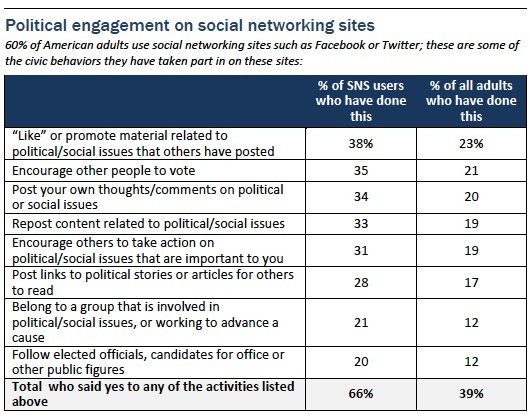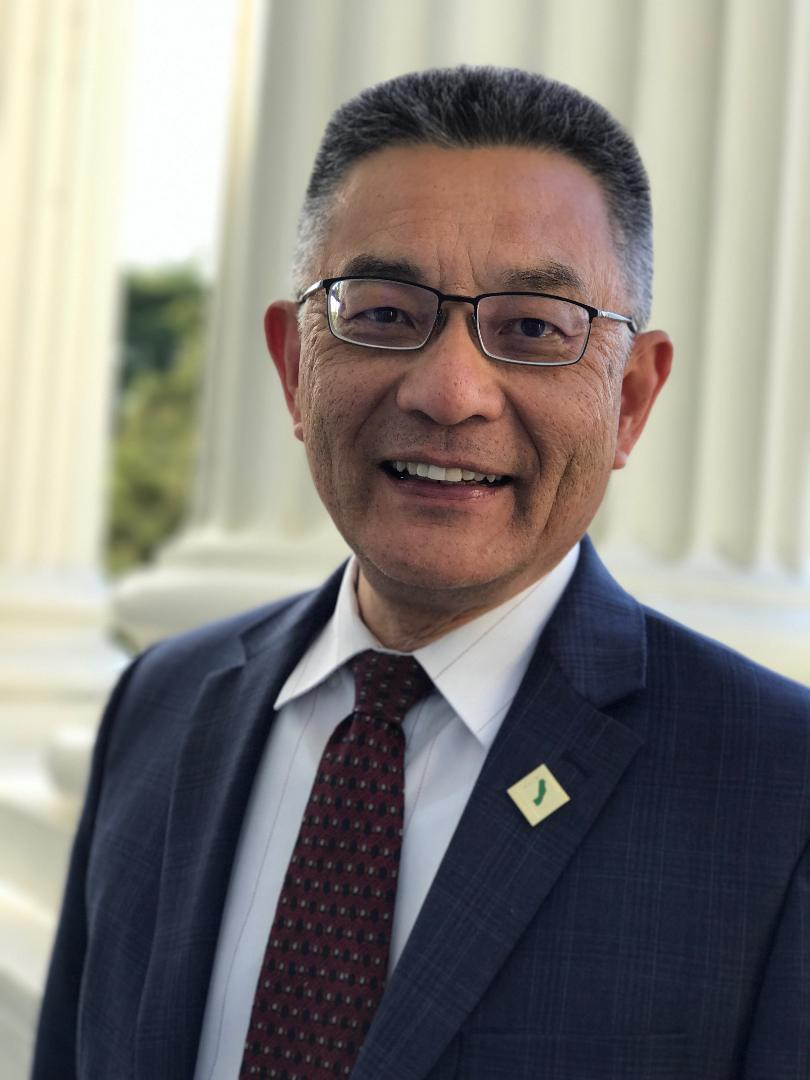Civic Engagement in the Digital Age
BY
Online and offline political engagement
This study examines online and offline political engagement and pays special attention to the role of social networking sites in people's political activities.1 There are several major findings:
- Class differences, especially those related to educational attainment, are prominent in political engagement of all kinds, whether that activity takes place offline, online, or within the specific context of social networking sites (SNS), though the trend is somewhat more moderate in SNS.
- There has been major growth in political activity on SNS between 2008 and this survey in 2012. The number of social networking site users has grown from 33% of the online population in 2008 to 69% of the online population in 2012. And there have been major jumps in the proportion of SNS users who post political news, who friend or follow candidates, and who joined an SNS group organized around political or social issues. In addition, notable shares of SNS users say their activity on the sites has prompted them to learn more about social or political issues and to take action around those issues.
- For most politically active SNS users, social networking sites are not a separate realm of political activity. They are frequently active in other aspects of civic life.
- Even as online platforms have grown more prominent in political affairs, Americans' day-to-day political conversations mostly occur offline.
In this survey, the Pew Research Center's Internet & American Life Project measured several broad categories of civic activity that Americans might engage in. The first finding is that half (48%) of American adults directly took part in a civic group or activity in the 12 months preceding our August 2012 survey. This includes anyone who did one or more of the following six activities:
- 35% of American adults have recently worked with fellow citizens to solve a problem in their community
- 22% have attended a political meeting on local, town, or school affairs
- 13% have been an active member of a group that tries to influence the public or government
- 10% have attended a political rally or speech
- 7% have worked or volunteered for a political party or candidate
- 6% have attended an organized protest
In the second category of public engagement, we found that 39% of American adults have recently contacted a government official or spoken out in a public forum about an issue that is important to them via offline means. In the third category, we found that 34% have done so via online methods. This includes anyone who did one or more of the following activities that might take place in either online or offline spaces:
- 22% of American adults have recently signed a paper petition; 17% have signed a petition online.
- 21% of American adults have recently contacted a government official about an issue that is important to them in person, by phone, or by letter; 18% have done so online, by email, or by text message.
- 7% of American adults have recently called into a live radio or TV show to express an opinion about a political or social issue; 18% have commented on an online news story or blog post about this type of issue.
- 3% of American adults have sent a letter to the editor to a newspaper or magazine by regular mail; 4% have done so online, by email, or by text message.
In the fourth category, 39% of American adults took part in some sort of political activity in the context of a social networking site such as Facebook or Twitter in the 12 months preceding our survey. This includes anyone who did one or more of the following eight activities listed in the table below:
In total, nearly three-quarters (72%) of all American adults did at least one of the activities that we measured in those four broad categories of civic and political engagement.
ActivitiesTraditional political activities are most common among the well-educated and financially well-off, regardless of whether they take place online or offline. On social networking sites, income-related differences are more modest — but civic engagement in these spaces is still most prevalent among those with higher educational levels.Those who live in higher income households and those with higher levels of education (specifically, those who have attended or graduated from college) are consistently more likely than those with lower income or education levels to take part in many of the online and offline civic behaviors we measured in this study. This gap is especially pronounced for the following specific activities:
- Working with fellow citizens to solve a problem in one's community
- Attending a political meeting on local, town, or school affairs
- Being an active member of a group that tries to influence public policy or government
- Attending a political rally or speech
- Working or volunteering for a political party or candidate
- Contacting a government official about an issue that is important to you (both online and offline)
- Signing a petition (both digitally and on paper)
- Commenting on a news story or blog post online
On the other hand, when it comes to the 60% of American adults who use social networking sites such as Facebook or Twitter, political participation is more balanced between lower and higher income Americans. Among social networking site users, political participation is identical for those who live in the lowest earning households (annual household income of less than $10,000) and highest earning households (annual household income of $150,000 or more).
Higher income Americans are more likely to use social networking sites in the first place, so income-related differences are evident when the base measurement applies to all adults – not just SNS users. But even on an "all adults" basis, the gap in political participation between the lowest and highest income groups is generally smaller on social networking sites than it is for other types of political engagement.
At the same time, even as differences in social networking engagement are less pronounced with respect to income, the college-educated are significantly more likely than those with a high school education to take part in nearly every SNS-related behavior we measured in our survey. And in contrast to income (where SNS users in the lowest and highest categories were equally likely to use these sites for political reasons) these educational differences persist even when we account for different levels of adoption between those with lower and higher education levels.
In other words, even as the impact of income on political participation is more modest in the context of social networking sites, socio-economic distinctions related to education still play a prominent role in these spaces.
More broadly, those at the lower end of the socio-economic spectrum are generally less involved with the day-to-day outreach, chatter, and discussion around political issues — regardless of whether those discussions take place in physical or digital spaces. Compared with the well-educated and financially well-off, they are much less likely to receive political communications through a variety of channels, or to have conversations about political or social issues with others in either online or offline venues. Ultimately, political issues, political activity, and political discussion are less present in the lives of these Americans than they are for those at the upper end of the socio-economic scale.
Younger adults are just as likely as older adults to be engaged in many political activities, and are much more likely to be politically active on social networking sites.Most types of political engagement are equally commonplace among Americans of different generations. There are only modest age-related differences when it comes to getting involved in political groups or in-person activities, speaking out publicly in online spaces, or speaking out publicly in offline spaces.2
Social networking sites (SNS) stand in contrast to these other venues. Political engagement on social networking sites is especially commonplace among the youngest Americans, as two-thirds (67%) of all 18-24 year olds (and nearly three quarters of those young adults who use social networking sites) engaged in some sort of social network-related political activity in the 12 months preceding our survey. Older adults tend to be fairly politically active on social networking sites to the extent that they use them, but are relatively unlikely to use these sites in the first place. So, although nearly six in ten SNS-using seniors are politically active on these sites, that works out to just 13% of all Americans in the 65+ age group.
Indeed, the youngest American adults are more likely to engage in political behaviors on social networking sites than in any other venue. And the typical (median) 18-29 year old took part in three of the eight SNS-oriented political behaviors measured in this survey. The general youth of the "political SNS user" group also helps to explain the balance between high- and low-income users when it comes to political activity in these spaces, since many of these younger adults are only beginning their careers and have not fully maximized their earning potential.
Source : https://www.pewresearch.org/internet/2013/04/25/civic-engagement-in-the-digital-age/
When you subscribe to the blog, we will send you an e-mail when there are new updates on the site so you wouldn't miss them.




